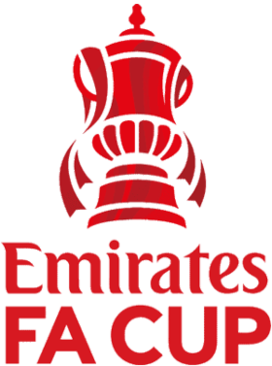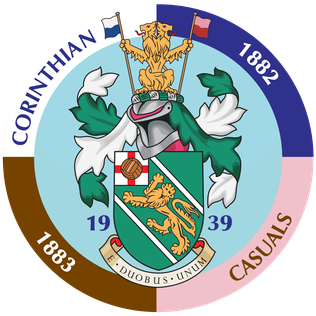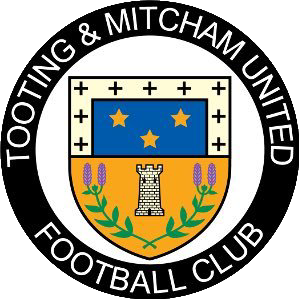
The Football Association Challenge Cup, more commonly known as the FA Cup, is an annual knockout football competition in men's domestic English football. First played during the 1871–72 season, it is the oldest national football competition in the world. It is organised by and named after The Football Association. Since 2015, it has been known as The Emirates FA Cup after its headline sponsor Emirates. A concurrent Women's FA Cup has been held since 1970.

The Isthmian League is a regional football league covering Greater London, East and South East England, featuring mostly semi-professional clubs.

The Football Association Challenge Vase, usually referred to as the FA Vase, is an annual football competition for teams playing in Steps 5 and 6 of the English National League System. For the 2017–18 season 619 entrants were accepted, with two qualifying rounds preceding the seven proper rounds, semi-finals and final to be played at Wembley Stadium.

Canvey Island Football Club is a football club based in Canvey Island, Essex, England. They are currently members of the Isthmian League Premier Division and play at Park Lane.

Clapton Football Club is a football club based in Plaistow, East London. The club are currently members of the Eastern Counties League Division One South and play at the Terence McMillan Stadium in Plaistow following their 2019 eviction from their long-term home, the Old Spotted Dog Ground in Forest Gate.

The Football Association Challenge Trophy, commonly known as the FA Trophy, is a men's football knockout cup competition run by and named after the English Football Association and competed for primarily by semi-professional teams. The competition was instigated in 1969 to cater to those non-league clubs that paid their players and were therefore not eligible to enter the FA Amateur Cup.

Wealdstone Football Club is an English semi-professional football club based in Ruislip, London Borough of Hillingdon, and affiliated to the Middlesex County Football Association. They currently play in the National League, the fifth level of the English football league system. Their traditional colours are royal blue and white, and they are nicknamed "The Stones" or "The Royals".

Corinthian-Casuals Football Club is a football club based in Tolworth in the Royal Borough of Kingston upon Thames, England. Affiliated to the London Football Association, they are currently members of the Isthmian League South Central Division and play at King George's Field.

Ilford Football Club is a football club based in Ilford, East London, England. Affiliated to the Essex County Football Association, they are currently members of the Essex Senior League and play at the Cricklefield Stadium. Nicknamed the Foxes, the club play in blue and white hoops or stripes.

Bromley Football Club is a professional football club based in Bromley, Greater London, England. They are currently members of the National League, the fifth tier of English football, and play at Hayes Lane.

Sutton United Football Club is a professional association football club from Sutton, South London, England. The team competes in League Two, the fourth level of the English football league system.

Tooting & Mitcham United Football Club is an association football club based in the London Borough of Merton. They are currently members of the Combined Counties League Premier Division South and play at Imperial Fields in Morden. Their nickname is "the Terrors" or "the Stripes".
The 1871–72 Football Association Challenge Cup was the first staging of the Football Association Challenge Cup, usually known in the modern era as the FA Cup, the oldest association football competition in the world. Fifteen of the association's fifty member clubs entered the first competition, although three withdrew without playing a game. In the final, held at Kennington Oval in London on 16 March 1872, Wanderers beat the Royal Engineers by a single goal, scored by Morton Betts, who was playing under the pseudonym A. H. Chequer.
The Trinidad and Tobago FA Trophy, is the premier knockout tournament for teams in Trinidad and Tobago that is open to all clubs affiliated with the Trinidad and Tobago Football Association. The FA Trophy is the oldest football competition in Trinidad and Tobago, dating back to 1927 when Shamrock claimed the inaugural trophy. Since the competition involves clubs of all standards playing against each other, there is the possibility for 'giant-killers' from the lower divisions of eliminating top clubs from the tournament and even theoretically win the trophy, although lower division teams rarely reach the final.
The 1922–23 FA Cup was the 48th season of the world's oldest association football competition, the Football Association Challenge Cup. Bolton Wanderers won the competition, beating West Ham United 2–0 in the first final to be held at Wembley Stadium, London.













